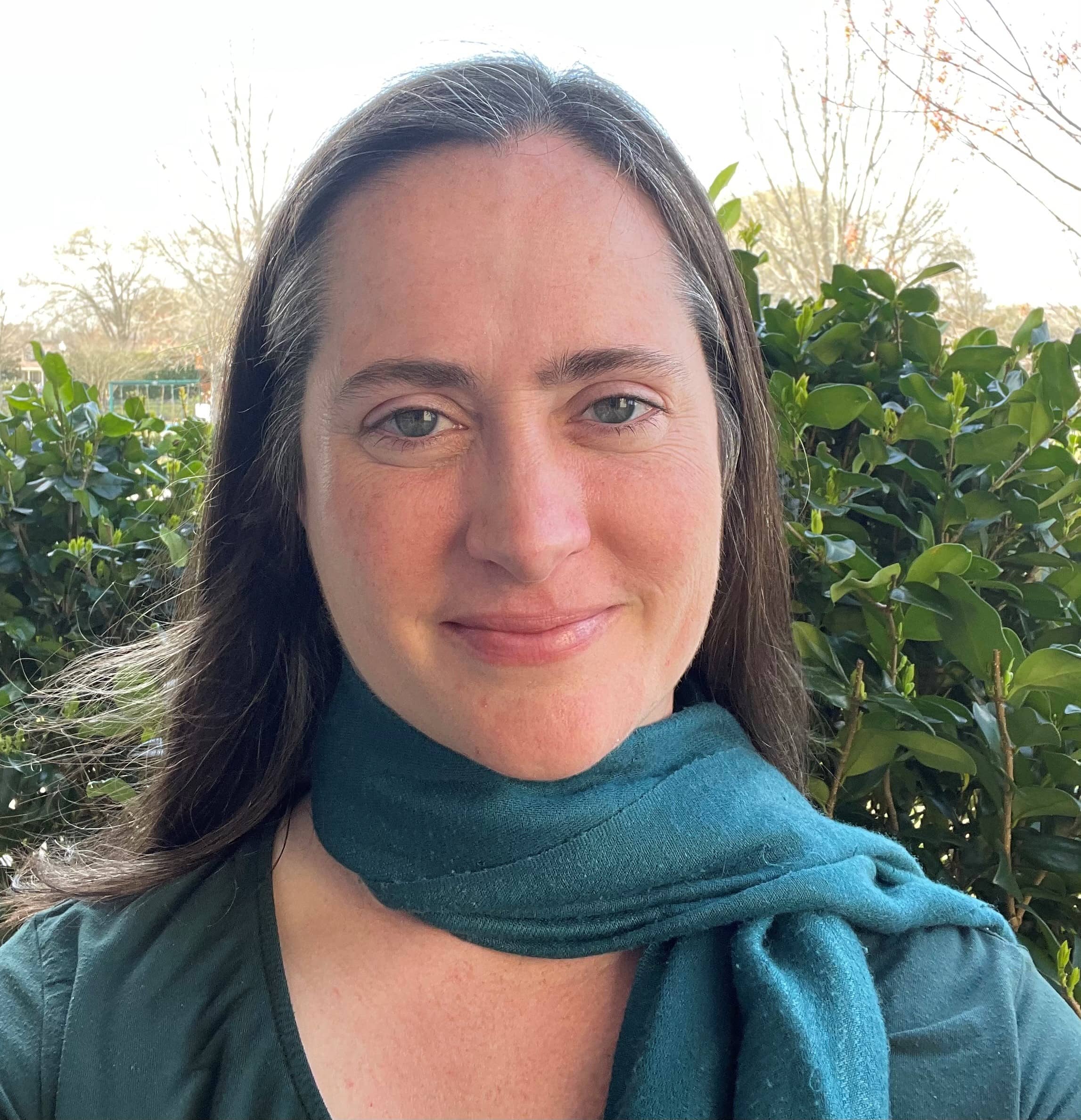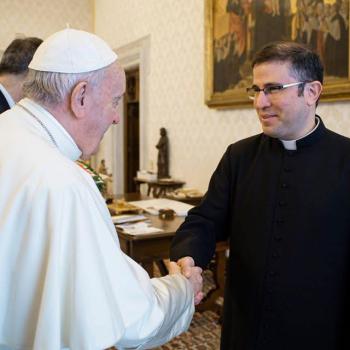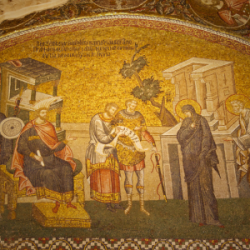
The Theater of Strong Medicine
During the messy birth of modern medicine, some surgeons became showmen: they performed operations in a theater before an audience of the curious.
Is there any drama like the drama of surgery? A skilled champion sweats; an agonized victim bleeds; life contends with death. Public surgeries did not cease to sell tickets for lack of spectacle-seekers.
No, operating theaters were doomed on the supply side by the advance of germ theory. The performances had become no fun anyway, thanks to new best practices like anesthetizing patients and prioritizing precision over speed.
A Matter of Life and Death
The operating theaters of theology might seem more C-SPAN than Grey’s Anatomy. What could theology possibly offer to the sort of people who would pay to see a spleen removed or tune in to Dr. Pimple Popper?
If the divine is but a mirage, theology is absurd, deleterious, and boring.
If, however, the divine is the sole grounds and very destiny of humanity, then there is nothing more important, nothing more helpful, and nothing less boring than theology. If there really is a theos, theology has no rival for drama: it really is a matter of life and death, and it should rivet us. If a planet-killing comet were headed straight for earth, theology would eclipse all other fields of knowledge; studying math or history would suddenly seem absurd.
But where should we do theology? Is the college dining hall as good as the classroom? Is the monastery the equal of the afternoon talk show?
How do we know if our participation, like that of the unwashed throngs watching those Gilded Age surgical spectacles, is more pathogenic than educational?
And can we avoid the mistakes of those showmen-surgeons who aimed for fame, speed, and spectacle at the expense of the good of their patients, or will pride prevent progress?
Operating Theaters
All theological thought is shaped by its operating theater. If we fail to attend to the setting, we will make mistakes in interpretation and application – mistakes that range from the silly to the damaging.
Consider controversy, contemplation, and care. All three theaters have produced great saints and doctors of the Church. They vary in approach, emphasis, and aims: controversy leads with truth, contemplation with beauty, and care with goodness. Each theater has its merits and sublime fruits, its deficits and blind spots.
Theater of Controversy
Controversy does not refer to disagreements between Christians and non-Christians. Those disagreements define identities and have to do with first principles, and they are the matter of interreligious dialogue and evangelization.
Controversy is in-house disagreement among Christians. The object of theology in the theater of controversy is the articulation of the truest and most robust version of the Christian faith. Preservation of union takes second place, for commitment to truth is primary here, even at the price of peace.
As the first generations of Christians worked out the implications of the Gospel, disagreement abounded. Controversy among the baptized – and especially among the ordained – seemed not a bug, but a feature. The Holy Spirit preserved the early Church from enshrining any errors as doctrine, but His process did not preclude banishments, riots, and fistfights. The Spirit worked in and through the disagreements of the faithful.
Doctor of Controversy: St. Athanasius of Alexandria
After St. Paul, perhaps no mere mortal campaigned as fiercely or effectively for truth as Athanasius.
The controversy in the fourth century centered on the divine identity of Jesus Christ. Athanasius’s fellow bishop Arius held that Jesus was not fully divine and had not always existed. For Arius, Jesus Christ is best described as the highly exalted creation of God the Father.
The Arian position has advantages: it sounds biblical; it has seemingly better continuity with Jewish messianic expectations; it is easier to comprehend than the orthodox articulation.
Athanasius did not oppose Arius on these grounds, but instead argued that Arius was contradicting tradition. If someone like Arius could innovate, then there was no such thing as Christianity. If each new era could depict Christ as they wished, He might as well never have really revealed Himself at all.
Doggedly committed to the beliefs echoed down from apostolic times, Athanasius immersed himself in Christological scholarship. He made the case that Jesus Christ was of the same substance as God the Father and had a divine nature, that the Son is eternally begotten, and that there never was a time that the Son did not exist. In his career, Athanasius helped define the theater of controversy: it sifts through what seems new to determine what is a blossoming of a long-lived plant and what is a newly sprouted weed.
Heresy du Jour
In every age, at least one interesting idea will emerge to throw the Church into debate. Today, controversy is amplified by new media and so becomes practically inescapable for even the least intellectual Christians. To take one example, David Bentley Hart and several Jesuits are promoting the idea that hell cannot possibly be the real destiny of any human souls.
What would Athanasius do?
He would take universalism very seriously. Athanasius would dive in and read everything he could find from Scripture and from the first centuries of Christianity. With great care, he would test the proposed doctrine for its roots and fruits. He would not let anyone’s feelings or pastoral instincts stand in the way.
And if he had access to print or new media, he would only ever publish what he was sure was true – theology does not benefit from hot takes or quasi-formed conclusions. The truth should not be a matter of estimation or opinion, even in the midst of controversy. Theology in this theater has winners and losers, but it ultimately serves as the grounds for communion.
Theater of Contemplation
Hildegard von Bingen did her theological work in a very different context: medieval monastic life, featuring self-denial, constant prayer, and order.
A monastery’s rhythm of prayer and silence facilitates contemplation. Much of the fruit yielded by contemplation is handed on through conversation and practice, not text and argument.
The theater of contemplation is a theater of beauty. Here, we care less about careful distinctions into parts and more about the appreciation of the whole. Here, theology can be colorful, inefficient, and extravagant. It works to imagine more deeply, illuminate more brightly, and transform more fully. It is deeply personal and seeks to connect all creation to the Creator.
If there be any weakness of this theater of theology, it is that outsiders fail to take it seriously: Beauty cannot be measured! It defies clean, careful definition! Pace Dostoevsky, it does not seem to be rescuing the world! Perhaps this is why it took 800 years for the Church to declare Hildegard a doctor of the Church.
Yet contemplation is very serious. It engages reality with all its joys and sufferings, and by surrendering to the divine it lets God turn mourning into dancing. Even the most cynical interpretation of Hildegard’s mystical visions, i.e., that they were just horrible migraines, grants to her that she brought forth beauty from pain.
In her life of contemplation, Hildegard produced music, recipes, visual art, and poetry. Critiquing Hildegard’s theological work for precision of terminology and practicality of application would be akin to critiquing a brownie for not tasting like a Caesar salad.
Theater of Care
In contrast to the monastic pace of contemplation, theology in a pastoral setting is as busy and complicated as the people needing care.
In the theater of care, theologians have the object of communicating the truth, not shaping or deepening it. Theology here has the task of strengthening faith, healing wounds, and guiding discernment. It is very practical, and God’s transcendental quality of goodness has the leading role.
In the theater of care, distinctions and conclusions are applied to the questions of the flock: Should I adopt a human embryo? How can a country defend itself against violence and remain true to the Prince of Peace? How dare “the Church” tell me what to do with my money?
Faced with ignorance, doubt, and disinterest, theologians here must avail themselves of beauty to gain an audience. And in this theater, the theologian’s goodness and integrity matter very much.
Francis de Sales, doctor of the church from an era freshly wounded by massive schism, stood on this stage. He wrote clearly and convincingly. His simplicity and love for the poor made him a credible witness. Bishop Francis de Sales was a true model – not only did he write tracts and manuals for lay people, he also personally visited all the parishes in his care each year. He did not hide from daily needs of his brethren.
St. Francis suggests a bouquet metaphor for this theater of theology: the flowers are always of the same kind, but the theologian arranges them so that they can be noticed and appreciated ever anew.
Pastoral care is a theater fraught with interpersonal drama, but it is a place where goodness abounds. The truths tested in controversy and elaborated in contemplation reach the masses in preaching, teaching, and counseling. The real works of mercy live here; the other theaters find their flowering in pastoral care.
Final Thoughts
•Truth needs alliances with goodness and beauty lest it sound like a clanging cymbal. Goodness needs truth and beauty lest it lapse into a monstrous version of itself, like the demonically clever ‘goodness’ of euthanasia and eugenics. Beauty must be firmly anchored in goodness and truth lest it become vain and empty.
•In addition to Scripture, people of faith should read theology from all three theaters throughout the year, always attentive to context and objectives, and always noting what a book or article is not trying to do.
•Lastly, let us recall that the Divine Physician is not totally opposed to bloody spectacles in the theater of this world: from the Passover Lamb to the Lamb of God, the best theology is done by God Himself.
12/15/2022 10:08:04 PM





